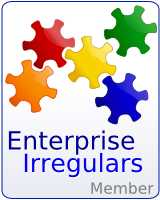Shai Agassi to Leave SAP
From the SAP Press Release:
SAP AG today announced that it will extend the responsibilities of its executive management team to reinforce the company’s growth strategy. These changes come with the announcement of the departure of Executive Board member Shai Agassi, who by mutual agreement with the company, will leave to more quickly commit himself to his personal agenda of environmental policy and alternative energy sources, and other issues. In making this announcement, SAP confirms its commitment to the company’s current product and platform strategy, and its dedication to the success of SAP customers and partners.
From fellow Irregular Josh Greenbaum:
Doug Merritt, currently an EVP at SAP in Palo Alto, will get the lion's share of global responsibility for product, and will take ownership of Duet, GRC, and some of the other successes that Agassi helped initiate. Jim Hagemann Snabe, will take over responsibility for the MySAP suite, and in general get a much-deserved higher profile in the company. Peter Graf will gain an elevated position in global marketing. I'll profile some of the other changes as they become known. Other power-hitters, like Leo Apotheker, Kraus Kreplin, Peter Zencke, and others are staying put or moving into more important roles...
From ex-SAP-er Jeff Nolan:
SAP is a complex culture and an even more complex organization, I suspect a lot of people will view this as Palo Alto vs. Walldorf, or the Return of Zencke, but the reality is far less dramatic. The bottom line is that life will go on, the depth of the bench will reveal itself...
From resident curmudgeon Vinne Merchandani:
Shai's biggest contributions to SAP - charisma, and talent recruitment, especially in Palo Alto
biggest liability - I thought was too much focus on SOA, NetWeaver, platform issues - not enough on applications which is after all SAP's core strength.
[SAP][Shai Agassi]
SAP AG today announced that it will extend the responsibilities of its executive management team to reinforce the company’s growth strategy. These changes come with the announcement of the departure of Executive Board member Shai Agassi, who by mutual agreement with the company, will leave to more quickly commit himself to his personal agenda of environmental policy and alternative energy sources, and other issues. In making this announcement, SAP confirms its commitment to the company’s current product and platform strategy, and its dedication to the success of SAP customers and partners.
From fellow Irregular Josh Greenbaum:
Doug Merritt, currently an EVP at SAP in Palo Alto, will get the lion's share of global responsibility for product, and will take ownership of Duet, GRC, and some of the other successes that Agassi helped initiate. Jim Hagemann Snabe, will take over responsibility for the MySAP suite, and in general get a much-deserved higher profile in the company. Peter Graf will gain an elevated position in global marketing. I'll profile some of the other changes as they become known. Other power-hitters, like Leo Apotheker, Kraus Kreplin, Peter Zencke, and others are staying put or moving into more important roles...
From ex-SAP-er Jeff Nolan:
SAP is a complex culture and an even more complex organization, I suspect a lot of people will view this as Palo Alto vs. Walldorf, or the Return of Zencke, but the reality is far less dramatic. The bottom line is that life will go on, the depth of the bench will reveal itself...
From resident curmudgeon Vinne Merchandani:
Shai's biggest contributions to SAP - charisma, and talent recruitment, especially in Palo Alto
biggest liability - I thought was too much focus on SOA, NetWeaver, platform issues - not enough on applications which is after all SAP's core strength.
[SAP][Shai Agassi]





